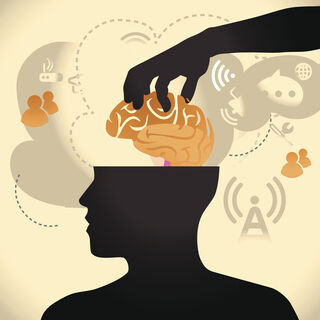Child Development
The Psychology of Adults Who Are Controlled by a Parent
When childhood dynamics play out in adulthood, the spouse can get roped in.
Posted August 1, 2022 Reviewed by Michelle Quirk
Key points
- Conflict over competing loyalties is a dysfunctional family dynamic with men who haven't psychologically separated from their mothers.
- To have a secure adult relationship, a developmental transition has to occur in which the spouse replaces the mom as the primary attachment.
- Childhood emotional manipulation can create psychological vulnerability that affects adult romantic attachments.

When we interact as adults with our parents, childhood family dynamics are readily re-experienced and re-enacted, with spouses getting pulled into the mix and creating conflict. A particularly toxic dynamic involving competing loyalties plays out with certain men and their moms, wreaking havoc in their marriages and interfering with "launching" as men within a mature new attachment relationship. How the scene unfolds and the effects depend on the degree of psychological “differentiation” achieved by the man from his mom and whether he has created secure boundaries around his marriage and new family, aligning himself with his spouse, not his mom.
Moms and Guilt-Tripping
Ryan’s mom was notorious for making him feel guilty about how he divided his time, accusing him of abandoning her, and directing hate and blame toward his wife, Danielle. Losing her hold over Ryan as he appropriately shifted his loyalties to his wife was the ultimate threat to her sense of security and control.
Loyalty binds are commonly part of a range of dysfunctional family dynamics. A particular variation may occur with moms who have a history of unresolved trauma, loss, or insecure attachments with their own moms.

This can lead to a parallel and compensatory style of attachment with their own children, in this case, their sons, perpetuated by a lack of connection with—and resentment toward— their husbands.
Without realizing it, they may rely on the child for emotional caretaking and unconsciously use them to make up for previous loss from their own childhood.
Unresolved issues from a mom’s own childhood, particularly around separation and loss, can affect the quality of attachment with their children, impeding their capacity to recognize and accommodate the child’s psychological needs and rhythms and to let that, rather than their own need for validation and security, guide their interactions (Sroufe, 2005).

"Good-Enough Mothering"
“Good-enough mothering” involves a delicate dance of noticing and attuning to the child’s own rhythm and intuitively adjusting oneself to get in sync with the child’s changing needs for closeness or distance, stimulation or retreat. This process begins in infancy.
Healthy attachment requires moms to be secure enough to allow their children to safely separate from them without trying to reel them back in through the threat of anger, withdrawal, guilt, and shame.
Childhood Emotional Manipulation and Subsequent Emotional Vulnerability
Withholding love and being cold is experienced by children as abandonment and deep rejection of their core being, rupturing the attachment bond needed for basic security and psychological survival. (For more on this topic: Is Shame Good or Bad: The Effects of Shame and Guilt.)

As such, these reactions are powerful punitive forces of control that shape early development, creating ongoing psychological vulnerability in the child. Furthermore, they operate invisibly and are transmitted and received unconsciously through the behind-the-scenes music of the interaction, compounding the effect on the child. (For more on this topic: The Psychology of the Guilt-Tripper.)
Rivalry and the Need to Be the Primary Love Attachment
When a boy grows up and forms his own family, a mom with an anxious, insecure attachment style may feel threatened and refuse to let go, secretly needing to remain the primary love attachment. This may not be conspicuous until her son finds a romantic love partner and devotes himself to her, allowing a rival to enter the scene. The situation then gets enacted in full drama, often around family get-togethers when the mom’s explicit demands and (unspoken) expectation of “loyalty” (e.g., exclusive love) from her son compete with his marriage and the needs of his new family.
Why Men Stay “Loyal” to Their Moms
Growing up, Ryan adapted by unconsciously detaching from himself and becoming “other-directed” and accommodating to avoid conflict and stay under the radar, disconnected from his own authentic experience. His reactions, even once he was married, continued to be instinctive, driven by fear and dread of his mom’s unhappiness and anger. When she was angry or hurt, through a process of projective identification, he took on her feelings as if they were his own, experiencing the burden of her emptiness and the feelings of guilt, shame, and badness she projected onto him when he dared to separate and have his own mind.
Projective Identification and Shared Delusional Cycle

Projective identification is an unconscious psychological process in relationships in which one person’s disowned feelings are put onto the other. The recipient identifies with these projected feelings as if they were his own, and both enter into a shared cycle confusing whose feelings are whose.
In this case, Ryan experienced his mom’s rageful accusations of abandonment as an emotional truth, feeling depressed, guilt-ridden, and mad at himself for not looking out for her. (It is important to note here that this "empathic" resonance is often inaccurate and exaggerates what the other person, who has a different psychological makeup and rigid defense, in fact, experiences or would feel.)
Forbidden: Separation, Autonomy, and Having a "Self"

No one was available when Ryan was growing up to help him understand what was happening or give him a safe space to experience his own feelings, which went underground and became compartmentalized.
Without help articulating their own and others' states of mind through words and emotional resonance ("mindsight"), children may not develop a sense of themselves.
This self holds the inner wisdom to help us gauge what’s happening in our relationships, make decisions that are true to ourselves, and parent our own children (Siegel & Hartzell, 2018). Importantly, a secure sense of self provides the scaffolding needed for mutuality with our partners.
Unintended Collusion
In cases such as Ryan's, the merger with the mom and lack of a healthy boundary is so complete and unconscious that men are unaware of the source of their resentment, easily displacing it onto their partner, usually a safer target than the mom. This pattern leads to unintended collusion with the mom, causing the marriage to become fractured, until he is able to own his unexpressed conflict with his mom and recognize that she is the source of his anger. A persistent inability to acknowledge anger toward his mom is ongoing evidence that the man’s original, once adaptive, survival strategy designed to defend against the penalty of any emotional separation from her is still in play.

Ryan needs to step back and see what is really happening to disentangle himself from his mom's projections and choose his wife as his primary partner in life, without fearing his mom’s retribution.
Hope and Help for Couples
When people recognize that their feelings are a re-experiencing of past psychological dynamics, they can develop the courage to set boundaries.
References
Siegel, D.J., & Hartzell, M. (2018). Parenting from the inside out: how a deeper self-understanding can help you raise children who thrive. Scribe Publications.
Sroufe, L. A. (2005). Attachment and development: A prospective, longitudinal study from birth to adulthood. Attachment & Human Development, 7(4), 349–367. https://doi.org/10.1080/14616730500365928




